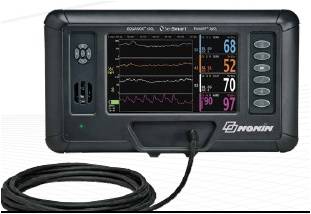Gallery | News | Blog | Contact Us
Gallery | News | Blog | Contact Us

Near-infrared spectroscopy (NIRS) is a non invasive device used to monitor regional blood flow in cerebral region which is based on balance between cerebral oxygen delivery and consumption. Apart from intra operative monitoring during adult and pediatric cardiac surgery, this monitor is now being used in diverse clinical fields including neurosurgery and vascular surgery. The use of NIRS monitoring during immediate post operative care of cardiac surgery patients is not explored well. We recently used NIRS monitoring during post operative period of Blalock Taussig shunt.
A newborn baby with pulmonary atresia underwent palliative modified Blalock Taussig on day 3 of life. Cerebral rSO2 was monitored using NIRS (SenSmart, NONIN). Baseline SpO2 recorded in ICU post surgery was 92% and cerebral rSO2were 72% and 75% in right and left respectively. At 2 hrs, a drop in rSO2 was to 63% and 50% on right and left respectively was observed. At that point, SpO2 was 88%, mean arterial pressure was normal, haemoglobin level was 11.1 gm/dl. A fall in SpO2 to 50 % occurred few minutes after the fall in rSO2 and auscultation revealed faint shunt murmur. Echocardiography showed minimal flow present in the BT shunt. A shunt blockage was anticipated and fluid bolus of normal saline 10ml/kg, heparin bolus of 50 IU/kg was given. Hyperventilation was done to decrease the CO2 (FiO2 was already set at 100% on ventilator) and norepinephrine was also initiated to increase systemic driving pressure. After these interventions, SpO2 and rSO2 improved to their baseline values. Two more similar episodes drop in rSO2 (> 20% drop) and SpO2 occurred at 6 hours and 11 hours post operative period. During each episode, drop in rSO2 preceded the drop in SpO2. Both these episodes responded to measures to increase pulmonary flow. Follow up 2D Echo done at 18 hours showed adequate flow through the BT shunt.
The baseline high degree of oxygen extraction in brain and the lower tissue partial pressure of oxygen in brain tissue is responsible for early fall of NIRS as compared to SPO2 .Cerebral NIRS monitoring post operatively in neonates undergoing BT shunt might be beneficial.